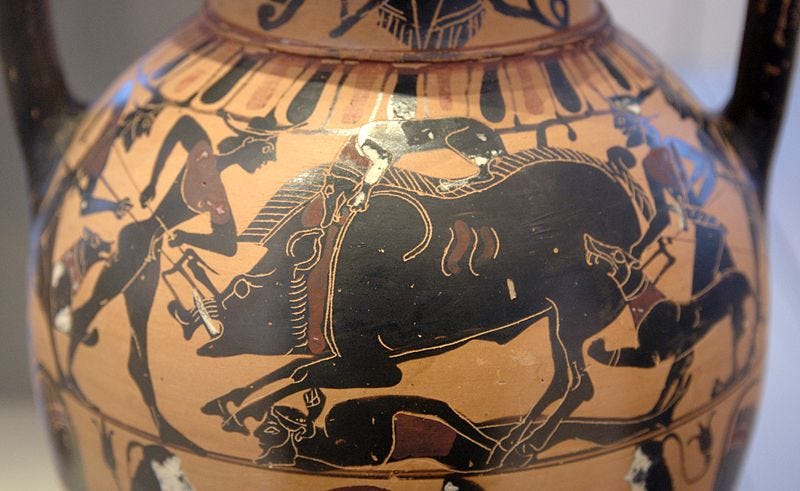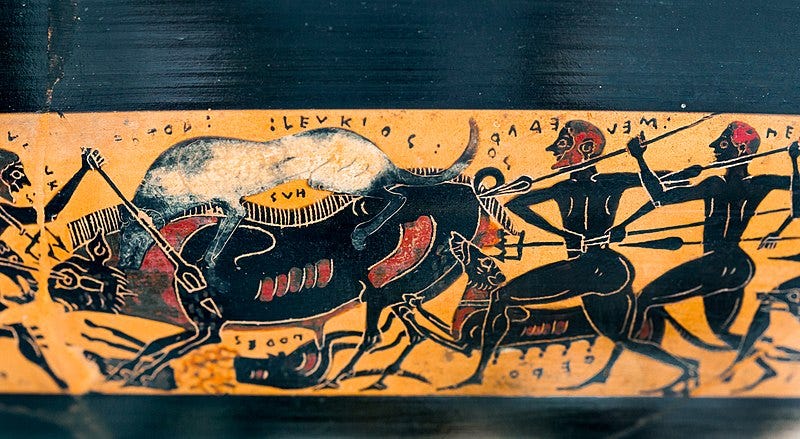This post examines the description and treatment of Thersites in book 2. Here is a link to the overview of book 2 and another to the plan in general. As a reminder, these posts will remain free, but there is an option to be a financial supporter. All proceeds from the substack are donated to classics adjacent non-profits on a monthly basis. Many of the ideas in this post are worked out at a greater length in an article published a few years ago; some additional passages are on this handout.
Iliad 2.211-224
“The rest of them were sitting, and they had taken their seats.
Only Thersites, a man of measureless speech, was still declaring--
A man who knew many disordered things in his thoughts and who
Strived pointlessly with kings out of order,
--whatever he thought would be amusing to the Argives.
And he was the most shameful man who came to Troy.
He was cross-eyed and crippled in one foot. His shoulders
Were curved, dragged in toward his chest. And on top
His head was misshaped, and the hair on his head was sparse.
He was most hateful to both Achilles and Odysseus
For he was always reproaching them. Then he was shrilly cawing
At lordly Agamemnon again, as he spoke reproaches. The Achaeans
Were terribly angry at him and were finding fault in their heart.
As he shouting greatly, he was reproaching Agamemnon.”῎Αλλοι μέν ῥ' ἕζοντο, ἐρήτυθεν δὲ καθ' ἕδρας·
Θερσίτης δ' ἔτι μοῦνος ἀμετροεπὴς ἐκολῴα,
ὃς ἔπεα φρεσὶν ᾗσιν ἄκοσμά τε πολλά τε ᾔδη
μάψ, ἀτὰρ οὐ κατὰ κόσμον, ἐριζέμεναι βασιλεῦσιν,
ἀλλ' ὅ τι οἱ εἴσαιτο γελοίϊον ᾿Αργείοισιν
ἔμμεναι· αἴσχιστος δὲ ἀνὴρ ὑπὸ ῎Ιλιον ἦλθε·
φολκὸς ἔην, χωλὸς δ' ἕτερον πόδα· τὼ δέ οἱ ὤμω
κυρτὼ ἐπὶ στῆθος συνοχωκότε· αὐτὰρ ὕπερθε
φοξὸς ἔην κεφαλήν, ψεδνὴ δ' ἐπενήνοθε λάχνη.
ἔχθιστος δ' ᾿Αχιλῆϊ μάλιστ' ἦν ἠδ' ᾿Οδυσῆϊ·
τὼ γὰρ νεικείεσκε· τότ' αὖτ' ᾿Αγαμέμνονι δίῳ
ὀξέα κεκλήγων λέγ' ὀνείδεα· τῷ δ' ἄρ' ᾿Αχαιοὶ
ἐκπάγλως κοτέοντο νεμέσσηθέν τ' ἐνὶ θυμῷ.
αὐτὰρ ὃ μακρὰ βοῶν ᾿Αγαμέμνονα νείκεε μύθῳ·
Thersites’ description also uses some language of disability in the ancient world: here, aiskhos (for “ugly” or “deformed”) and khlôlos (for “crippled” or lame”). The correlation between the disorderliness of his body and thoughts (ὃς ἔπεα φρεσὶν ᾗσιν ἄκοσμά) may not be causative, but it helps to establish a meaningful relationship between Thersites’ body, his behavior, and the hate his presence elicits.
Schol T. ad Il. 2.216a
“most shameful: this is also said of an ape.”
ex. αἴσχιστος: τοῦτο καὶ ἐπὶ πιθήκου.
Schol. BT [Aristonicus] ad Il. 2.217a
“pholkos: this is spoken once. Homeric pholkos means when the eyes are narrowed together, which means turned.”
Ariston. | Ep. φολκός: ὅτι ἅπαξ εἴρηται. Aim b (BCE3)T | ἔστι δὲ Hom. φολκὸς ὁ τὰ φάη εἱλκυσμένος, ὅ ἐστιν ἐστραμμένος. Aim
Homer presents a overlap between ‘beautiful body’ and ‘beautiful mind’ (a topic I explore in this article.) This physiognomic category error pervades a great deal of classical Greek culture. In the Iliad, Thersites transgresses physical boundaries through his unheroic body and ethical boundaries by using the genre of rebuke upward in the social hierarchy. He is hateful to both Achilles and Odysseus because they exemplify in a complementary fashion the ‘center’ or ideal of the heroic person—Achilles is the beautiful body, Odysseus is a beautiful mind. But both of them stay within the boundaries of ‘normal’ in their own deviance (Achilles’ political straying, Odysseus’ aging, imperfect body).
Thersites, labelled by many as a comic scapegoat, functions as an inferior in order to define the center as non-transgressive. This is, in particular, why he is hateful to Achilles and Odysseus: without him, their persons might be monstrous or disabled. And this also helps explain why Odysseus must physically beat Thersites in public.
But there is a tradition to Thersites outside of the way he is used in Homer. Ancient scholars etymologize his name and report, ironically, that he became disabled because of punishment for cowardice (making his body a marker of the consequences of his character).
Schol. T ad Hom. Il. 212a1 ex
“Thersites: the name is made from the Aiolic [version of tharsos] audacity, thersos.
ex. Θερσίτης δ' ἔτι: ὠνοματοποίησε τὸ ὄνομα παρὰ τὸ θέρσος Αἰολικόν
Schol. D ad Hom. Il. 2.212 [= Euphorion fr. 82]
“Because the goddess was enraged at Oineus’ lack of concern for sacrifices to Artemis, she sent a wild boar against the city. A band of the best of Greece when against it when it was ruining the country, as the poet says in the ninth book. Among them was also Thersites who, because he was coward, abandoned his assigned guard post and went instead hunting safety in some high position. He was being reproached and pursued by Meleager and fell from a cliff; [this is how] he became the sort of man Homer describes him as. Euphorion tells this story.”
Οἰνεῖ ἀμελήσαντι τῆς Ἀρτέμιδος θυσιῶν ἕνεκα ἡ θεὸς ὀργισθεῖσα ἔπεμψε τῇ πόλει σῦν ἄγριον. ἐφ᾿ ὃν ἦλθεν στρατεία τῶν ἀρίστων τῆς Ἑλλάδος, ἐπειδὴ ἐλυμαίνετο τῇ χώρᾳ ὥς φησιν αὐτὸς ὁ ποιητὴς ἐν τῇ Ι΄ [533], μεθ᾿ ὧν ἦν καὶ ὁ Θερσίτης, ὃς δειλωθεὶς κατέλειψεν τὴν παραφυλακὴν ἐφ᾿ ἧς ἦν καὶ ἀπῆλθεν ἐπί τινα τόπον ὑψηλὸν τὴν σωτηρίαν θηρώμενος. ὀνειδιζόμενος δὲ ὑπὸ Μελεάγρου ἐδιώκετο καὶ κατὰ κρημνοῦ πεσὼν τοιοῦτος ἐγένετο οἷον Ὅμηρος αὐτὸν παρίστησιν. ἱστορεῖ Εὐφορίων.
Schol AbT 212b1-2 ex
“they say that [Thersites] is the poet’s agent, that he appropriates his essence.”
Θερσίτης δ' ἔτι: ἐπίτροπον τοῦ ποιητοῦ φασιν αὐτόν, σφετερισάμενον τὴν οὐσίαν…
Schol. bT ad Il. 2.212b ex. 12–19 [= FGrH 3.123]
“Pherecydes says that [Thersites] was one of those who gathered to hunt the Kalydonian boar but that he was avoiding the fight with the boar and was thrown from a cliff by Meleager. This is how his body was deformed. People say he is a child of Agrios and the daughter of Porthaon. But if he is Diomedes’ relative, there is no way Odysseus would beat him. For he would only hit common soldiers. Hence, [the poet] has deployed him not [because of] his father or his country but only because of his manner and form, the things which the current situation needs.”
Φερεκύδης δὲ καὶ τοῦτον ἕνα τῶν ἐπὶ τὸν Καλυδώνιον κάπρον στρατευσάντων φησίν. ἐκκλίνοντα δὲ τὴν τοῦ συὸς μάχην ὑπὸ Μελεάγρου κατακρημνισθῆναι· διὸ καὶ λελωβῆσθαι τὸ σῶμα. ᾿Αγρίου δὲ καὶ Δίας τῆς Πορθάονος αὐτόν φασιν. εἰ δὲ συγγενὴς ἦν Διομήδους, οὐκ ἂν αὐτὸν ἔπληξεν ᾿Οδυσσεύς· τοὺς γὰρ ἰδιώτας μόνον ἔτυπτεν. εὖ δὲ καὶ οὐκ ἀπὸ πατρὸς αὐτὸν συνέστησεν, οὐδ' ἀπὸ πατρίδος, ἀλλ' ἀπὸ οῦ τρόπου μόνου καὶ τῆς μορφῆς, ὧν χρεία τὰ νῦν.

In the broader tradition, Thersites’ boldness leads to his death at Achilles’ hands.
Proclus, Chrestomathia 178–184
“Then Achilles killed Thersites because he was mocked by him when he reproached him, claiming he loved Penthesileia. A conflict arose among the Achaeans over the murder of Thersites. After that Achilles went sailing to Lesbos where, after he made a sacrifice to Apollo, Artemis and Leto, he was cleansed of the murder by Odysseus.”
καὶ Ἀχιλλεὺς Θερσίτην ἀναιρεῖ λοιδορηθεὶς πρὸς αὐτοῦ καὶ ὀνειδισθεὶς τὸν ἐπὶ τῆι Πενθεσιλείαι λεγόμενον ἔρωτα. καὶ ἐκ τούτου στάσις γίνεται τοῖς Ἀχαιοῖς περὶ τοῦ Θερσίτου φόνου. μετὰ δὲ ταῦτα Ἀχιλλεὺς εἰς Λέσβον πλεῖ, καὶ θύσας Ἀπόλλωνι καὶ Ἀρτέμιδι καὶ Λητοῖ καθαίρεται τοῦ φόνου ὑπ᾿ Ὀδυσσέως.
In some traditions, Penthesileia bore Achilles a child before she died.
Cf. Apollodorus, Epitome E 5
“…And later on, [Penthesileia] died at Achilles’ hands and he killed Thersites who was mocking him after her death because he had loved the Amazon.”
εἶθ᾿ ὕστερον θνήσκει ὑπὸ Ἀχιλλέως, ὅστις μετὰ θάνατον ἐρασθεὶς τῆς Ἀμαζόνος κτείνει Θερσίτην λοιδοροῦντα αὐτόν.
Of course, his contrast with Achilles and Odysseus (and others) becomes something of a trope in ancient literature
Plutarch’s Moralia 1065c-d Against the Stoics on Common Conceptions
“Achilles would not have had long hair if Thersites had not been bald.”
καὶ οὐκ ἂν ἦν Ἀχιλλεὺς κομήτης εἰ μὴ φαλακρὸς Θερσίτης.
Plato, Republic 10 620c-d
“A bit farther along among the final souls, he saw that of the ridiculous Thersites taking on the form of a monkey. By chance, he came upon the soul of Odysseus last of all as it made its choice still remembering its previous sufferings and, having decided to rest from the pursuit of honor, was spending an excessive among of time seeking the life of an untroubled private citizen. He found it barely situated somewhere and ignored by the rest of the souls. When he saw it, he said that he would have made the same choice even had he drawn the first lot and was happen to make this choice.”
πόρρω δ’ ἐν ὑστάτοις ἰδεῖν τὴν τοῦ γελωτοποιοῦ Θερσίτου πίθηκον ἐνδυομένην. κατὰ τύχην δὲ τὴν Ὀδυσσέως λαχοῦσαν πασῶν ὑστάτην αἱρησομένην ἰέναι, μνήμῃ δὲ | τῶν προτέρων πόνων φιλοτιμίας λελωφηκυῖαν ζητεῖν περιιοῦσαν χρόνον πολὺν βίον ἀνδρὸς ἰδιώτου ἀπράγμονος, καὶ μόγις εὑρεῖν κείμενόν που καὶ παρημελημένον ὑπὸ τῶν ἄλλων, καὶ εἰπεῖν ἰδοῦσαν ὅτι τὰ αὐτὰ ἂν ἔπραξεν καὶ πρώτη λαχοῦσα, καὶ ἁσμένην ἑλέσθαι.
Galen, Hygiene 16-17k
“Accordingly, then, they differ from one another in magnitude of more or less, just as the whiteness in show compares to the whiteness of milk: it is white for each it is not different in this, but it contrasts in being more or less white. In the same manner, if you will allow me to say, the health of Achilles does not differ from that of Thersites: inasmuch as it is health, it is the same, but it differs in another thing.”
κατὰ τὸ μᾶλλον ἄρα καὶ ἧττον ἀλλήλων διαφέρουσιν. ὥσπερ γὰρ ἡ ἐν τῇ χιόνι λευκότης τῆς ἐν τῷ γάλακτι λευκότητος, ᾗ μὲν λευκόν ἐστιν, οὐ διαφέρει, τῷ μᾶλλον δὲ καὶ ἧττον διαφέρει, τὸν αὐτὸν δὴ τρόπον ἡ ἐν τῷ Ἀχιλλεῖ, φέρε εἰπεῖν, ὑγεία τῆς ἐν τῷ Θερσίτῃ ὑγείας, καθ’ ὅσον μὲν ὑγεία, ταὐτόν ἐστιν, ἑτέρῳ δέ τινι διάφορος




